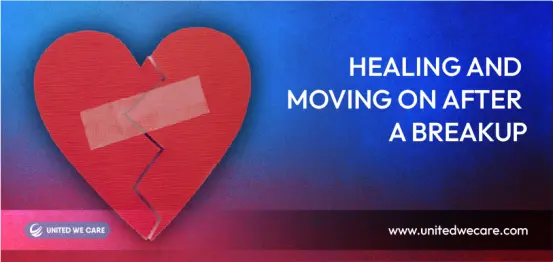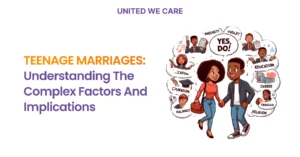Introduction
Almost every artist ever has captured the pain of a breakup. It is one of the most difficult and emotionally challenging experiences to go through. To leave something that brought peace and love is tough, even though you might have noticed that it is not sustainable. When you break up, a host of emotions come. You start lost, hurt, and confused about your future. However, healing and moving on after a breakup is possible with time, self-reflection, and the right coping strategies. We have curated this article to help you exactly with this.
What Does it Mean to Breakup?
In very detached and technical terms, a breakup is basically the ending of a romantic relationship between two individuals. It involves terminating the emotional, physical, and often legal commitments made during the relationship [1]. Regardless of the nature of the relationship, a breakup signifies the end of a significant emotional bond.
Most people expect that a breakup will come with significant emotional disturbance. However, anecdotal and research evidence has shown that the pain experienced differs for different people. The pain depends on how much commitment was there and how close the members of that relationship were. In one study, Robak and Weitzman researched this exact thing. They found that people experienced more distress when their intimacy level was high and when they were actually considering the possibility of marriage. [2]. In another study, Sprecher and colleagues found that relationships with higher levels of commitment, satisfaction, and duration tend to result in more significant distress during a breakup [3].
Read more- Can’t stop thinking about him
What are the Common Causes of a Breakup?
The reason for any breakup depends on the people and the dynamic of the people in the relationship. So, while no one can give a script of a breakup, there are some common causes. These include [4] [5]:
- Incompatibility: Incompatibility arises when partners value different things. For example, for you, your space might be essential, but for your partner, it might be a sign of distance. When partners are incompatible in some key areas and beliefs of their lives, then there are frequent disagreements and fights. Eventually, they get exhausted, and the relationship ends.
- Breach of Trust: No relationship can work if there is no trust in it. Sometimes, one of the partners breaks the trust when they lie or cheat, and that shatters the core of the relationship. Rebuilding trust becomes challenging, as the injured partner may struggle with feelings of hurt, insecurity, and fear of future betrayal.
- Competing Demands in Other Life Areas: Relationships require time, effort, and emotional energy. At times, one or more of the partner can have other areas in their life that take up most of the space. For instance, someone’s career might require them to spend all their time at work, or someone’s family might require a lot of effort. If this happens, the partners tend to neglect the relationship, and their bond grows weaker.
- Poor Communication and Conflict Resolution: No one can undermine the importance of communication in any type of relationship, but for a romantic relationship, this is the main glue. When partners are unable to listen to the other person or share truly what they feel, it breeds misunderstandings and conflicts.
- Lack of Intimacy: Intimacy is more than just physical and sexual closeness. Intimacy is emotional and it means sharing thoughts, feelings, and experiences with each other. Both physical and sexual intimacy are important for a healthy relationship. Even if one is absent, the relationship can break.
What are the Impacts of a Breakup?
Usually, the impact a breakup will have on you will depend on your involvement in the relationship. Nonetheless, there are some common impacts of a breakup, including [1] [4] [6]:
- Grief and Bereavement: A breakup can trigger intense grief and bereavement, akin to losing a loved one. It is essentially losing a loved one; just the “loss” is different than how people commonly describe it. When you break up, you go through the grief cycle and experience denial, anger, depression, etc.
- Loneliness and Social Isolation: Loneliness is one of the most common things you can experience upon break up. You become habituated to having someone with you, and when they are no longer there, their absence is felt strongly. This loneliness can also become social isolation for people who share a group of friends with their partners.
- Altered Sense of Self: Individuals may question their self-worth, experience a loss of confidence, and have reduced clarity on who they are when the relationship ends. Life with a partner may lead to the intertwining of their self-concept; thus, the relationship end may also lead to the loss of a part of oneself.
- Physical Symptoms: Emotions often affect the physical body in deep and significant ways. You might notice changes in sleep or eating habits after breakups. Some people sleep more, while some are not able to sleep. Some people also experience things like headaches and body pain when they break up.
- Positive Emotional Outcomes: But all is not lost after a breakup. Especially if your ex was toxic, you might experience positive feelings like relief and happiness. You may also notice your own resilience and undergo significant personal growth and self-discovery when the relationship ends. The recent Miley Cyrus hit “Flowers” is probably the best example to highlight this outcome.
How Do You Heal and Move On After a Breakup?
Allowing oneself to grieve and understanding that healing will take some time is essential to overcome the loss of a relationship. Some tips that can help in moving on after a breakup [7] [8]:
- Practicing Self-care: Self-care can mean any activity that brings you joy, healing, and peace. For instance, you could engage in activities like exercise, healthy eating, meditation, etc. You could also start some things that you had wanted to when you were in a relationship and could not either because of your partner or because of some other reason. This will give you a boost of self-esteem and remind you how vast your life is.
- Seeking Support: As mentioned above, breakups can make you feel lonely and isolated. When this happens, it is important to seek help from other people in your life who might be able to understand. Many people reunite with old friends and their family post a breakup and find that they have a support network. Additionally, you can seek professional support from a therapist who can offer a compassionate ear and a space for your to process your emotions.
- Engaging in Reflection: Relationships and breakups can be great teachers but only when people open themselves up to the lessons. You can take some time to reflect on your relationship and on things like what was your role in it, what did you learn, what are some things you wish to remember for the future, and even journal around these prompts.
- Creating Healthy Boundaries: It is obvious that you are going to miss your ex and that you would want some answers from them. You might even miss the routine or life you had together. But, you must to set boundaries with them and make sure that you both are not constantly contacting each other. It will be important for both of you to have some distance in between to ensure you heal.
- Accepting Reality and Responsibility: Acknowledging the end of the relationship and accepting that you are no longer together will take time, but it is an essential step. If you need, remind yourself of this thing or ask a friend to check in and remind it to you. At the same time, you also need to acknowledge that you had a role in the breakup too. When you start taking responsibility for it, moving on will be nearer.
More Information-Healing with Meditation
Conclusion
There is no doubt that healing and moving on after a breakup is challenging. But you can successfully navigate the healing process if you start by acknowledging that it is difficult and you are experiencing a number of emotions that need time and space for healing. You also need to keep in mind that each person heals differently, so taking the necessary time to process a breakup fully is perfectly fine.
Read more -Find Help and healing through Online Counselling
If you are struggling with a breakup and experiencing distress, contact our psychologists at United We Care. At United We Care, our team of experts is fully equipped to offer you the most appropriate solution for your overall well-being. You can also join our Healing from Heartbreak wellness program, which provides you with strategies for moving on from a relationship dissolution.
References
- “Breakup,” Wikipedia, https://en.wikipedia.org/wiki/Breakup (accessed Jul. 12, 2023).
- R. W. Robak and S. P. Weitzman, “The nature of grief: Loss of love relationships in young adulthood,” Journal of Personal and Interpersonal Loss, vol. 3, no. 2, pp. 205–216, 1998. doi:10.1080/10811449808414442
- S. Sprecher, D. Felmlee, S. Metts, B. Fehr, and D. Vanni, “Factors associated with distress following the breakup of a close relationship,” Journal of Social and Personal Relationships, vol. 15, no. 6, pp. 791–809, 1998. doi:10.1177/0265407598156005
- K. R. Carter, D. Knox, and S. S. Hall, “Romantic breakup: Difficult loss for some but not for others,” Journal of Loss and Trauma, vol. 23, no. 8, pp. 698–714, 2018. doi:10.1080/15325024.2018.1502523
- H. Terzi, “Romantic break-ups in young adulthood: The connotations, predictors, and common reasons,” open.metu.edu.tr, 2022. Accessed: Jul. 12, 2023. [Online]. Available: https://open.metu.edu.tr/handle/11511/98614
- A. McKiernan, P. Ryan, E. McMahon, S. Bradley, and E. Butler, “Understanding young people’s relationship breakups using the dual processing model of coping and bereavement,” Journal of Loss and Trauma, vol. 23, no. 3, pp. 192–210, 2018. doi:10.1080/15325024.2018.1426979
- R. Parent, “Stop Driving While Looking in the Rearview Mirror”: Personal Growth on the Road to Recovering from Post-breakup Regret, 2020. [Online]. Available: https://islandscholar.ca/islandora/object/ir%3A23901/datastream/PDF/view
- “8 ways to recover from a breakup,” Psychology Today, https://www.psychologytoday.com/intl/blog/culture-shrink/201602/8-ways-recover-breakup (accessed Jul. 12, 2023).









